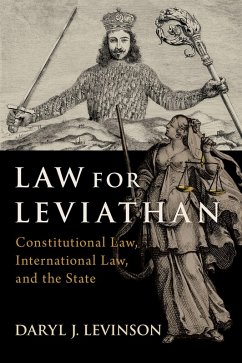For the past several centuries of Anglo-American legal thought, law has been paradigmatically understood as the product of the state. The state, operating through the legal and political institutions of its government, imposes law on the people who are its subjects. Over the same centuries, however, the development of international law and constitutional law has made the state itself subject to law. These systems of law for states necessarily work differently. For one thing, law for states must do without a super-state or government standing above the state, capable of creating and enforcing law. For another, the state is a unique kind of legal subject, calling for different behavioral models, moral standards, and regulatory techniques than those developed for ordinary people. It is precisely these differences that have long marked international law as a curious, and in many eyes dubious, form of law. Constitutional law, in contrast, has seldom been subject to the same doubts, or fully understood as different in kind from legal systems run by and through the state. As a result, constitutionalists have lagged their internationalist counterparts in coming to grips with the common project of making the state the subject rather than the source of law. By assimilating constitutional and international law as parallel projects of imposing law upon the state, and by highlighting the peculiarities of the state as a subject of law, this book aspires to close that gap, and to bring focus to
Law for Leviathan as a distinctive legal form.
Dieser Download kann aus rechtlichen Gründen nur mit Rechnungsadresse in A, B, BG, CY, CZ, D, DK, EW, E, FIN, F, GR, HR, H, IRL, I, LT, L, LR, M, NL, PL, P, R, S, SLO, SK ausgeliefert werden.









